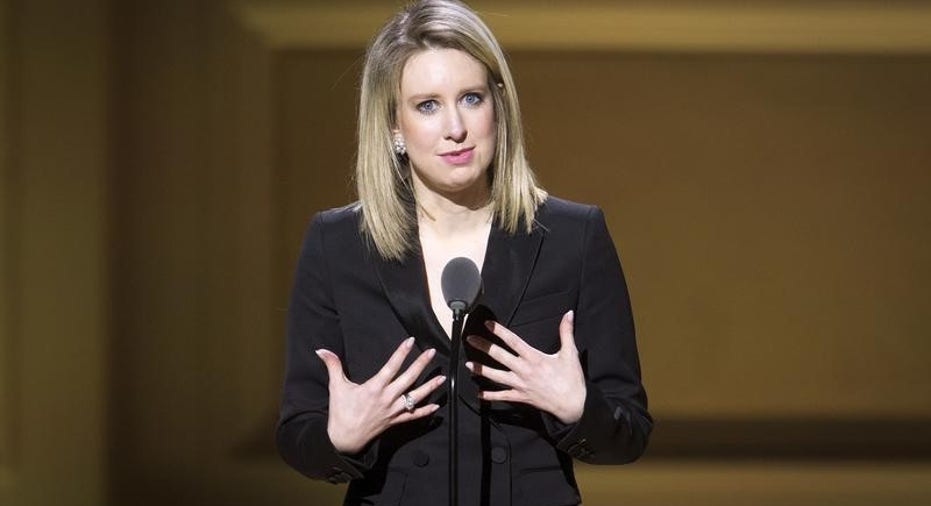Major Investor Sues Theranos

One of Theranos Inc.'s biggest financial backers has sued the embattled startup and its founder for allegedly lying to attract its nearly $100 million investment, according to a fund document and people familiar with the matter.
Partner Fund Management LP, a San Francisco-based hedge fund, filed the suit in Delaware Court of Chancery Monday afternoon, a letter to the hedge-fund's investors says.
"Through a series of lies, material misstatements, and omissions, the defendants engaged in securities fraud and other violations by fraudulently inducing PFM to invest and maintain its investment in the company," says the letter, which was reviewed by The Wall Street Journal.
The letter says Theranos, its founder Elizabeth Holmes and a former executive deceived the hedge fund by claiming it had developed "proprietary technologies that worked," and was close to getting regulatory approvals.
A spokesman for Theranos said "the suit is without merit and Theranos will fight it vigorously. The company is very appreciative of its strong investor base that understands and continues to support the company's mission."
The suit is the first sign of trouble from investors who poured about $800 million into the company, and then remained silent as it navigated a challenging year that began when the Journal first reported on shortcomings in its operations and technology last October.
Ms. Holmes had said Theranos could accurately perform dozens of tests using a few drops of blood, a premise that drove the firm to a valuation of $9 billion in a 2014 fundraising round. The Journal's investigation showed it used its flagship technology for a small number of tests, relied on devices made by conventional manufacturers and released questionable test results to patients.
Since then, Theranos has voided tens of thousands of test results, faces federal civil and criminal investigations, and is appealing a regulator's revocation of its blood-testing license at a California lab. The company has said it is cooperating with the investigations and is continuing to work with regulators.
The regulator barred Ms. Holmes from the lab industry, pending the company's appeal. Last week the company abruptly shut down its remaining testing operations in Arizona.
The company has said it plans to shift its focus away from blood-testing to developing and making new commercial technology that can accomplish its long-stated aim of making blood tests cheaper and more accessible.
In a letter to supporters last week describing that changed strategy, Ms. Holmes thanked her investors for providing the company with "the runway to realize our vision."
The lawsuit filed Monday by Partner Fund Management, which focuses on health-care and technology investments, adds a new challenge to Theranos's pivot plan.
The suit, disclosed to Partner investors Monday, was filed under seal in accordance with the rules of the Delaware court, which seek to protect confidential corporate information. The hedge fund's letter didn't include details of the allegations.
Partner is seeking to recoup damages in excess of its investment, in addition to costs associated with the action, said a person familiar with the lawsuit.
Partner made a $96.1 million investment in Theranos on Feb. 4, 2014, this person said.
Partner manages more than $4 billion. It mostly invests in publicly traded securities, but makes some investments in private firms such as Theranos.
Theranos, Ms. Holmes and former chief operating officer Sunny Balwani pitched the company to Partner managers beginning in December 2013, the person familiar with the case said.
The fund alleges that Ms. Holmes and Mr. Balwani claimed their technology could do many more types of tests than it was capable of performing, the person said. Regulatory records disclosed by the Journal earlier this year show the company's marquee Edison blood-testing device was being used to do only about a dozen tests before the company ceased using it altogether last year.
Partner also alleges, among other things, that Theranos overstated the scope of its submissions for Food and Drug Administration approval and its ability to meet the obligations it had agreed to in partnerships with companies like drugstore giant Walgreens Boots Alliance Inc. as it prepared to roll out its services, according to the person familiar with the suit.
Walgreens, which hosted Theranos locations at stores in the Phoenix area, walked away from the partnership in June.
The Partner suit claims that Ms. Holmes, Mr. Balwani and Theranos engaged in securities fraud, negligent misrepresentation and violations of the Delaware deceptive trade practices act, among other things, a person familiar with the document said.
Mr. Balwani couldn't immediately be contacted for comment.
The clerk's office at the Delaware Court of Chancery confirmed the case had been filed late Monday. The special court rules on disputes involving Delaware corporations. Theranos is incorporated in that state.
The Securities and Exchange Commission is investigating allegations that Theranos misled investors, people familiar with the matter say. The SEC has subpoenaed Partner in the case. The hedge fund is cooperating with authorities, said the person familiar with the suit.
The Partner letter to investors said the 12-year-old hedge fund has never before been a party to a judicial proceeding, and said it had filed the case to protect its investors.
As Theranos has faced rising scrutiny over the last year, most of its investors have remained on the sidelines. The company has attracted investments from venture capitalists, corporate partners and wealthy families.
Another large investor, Sandbox Industries, didn't respond to a request for comment. The Lucas Venture Group, which appeared to have removed references to its investment in Theranos from its website, declined to comment.



















